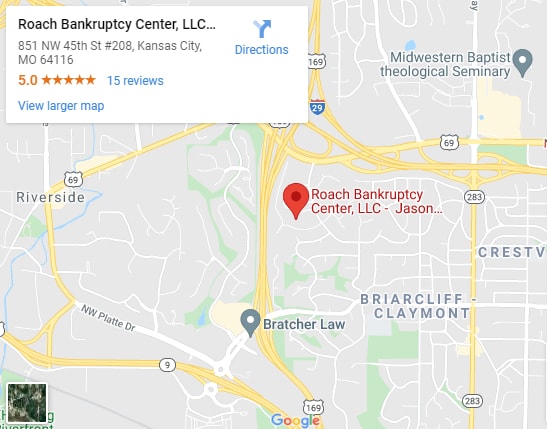Navigate the Complexities of Bankruptcy By Understanding Exemptions in Kansas City
Facing financial hardship can be an overwhelming experience, and considering bankruptcy may seem like the only way out. However, understanding the intricacies of bankruptcy laws, particularly exemptions, is crucial to making informed decisions. In Kansas City, Missouri, bankruptcy exemptions dictate which assets you can protect from creditors during bankruptcy.
While Missouri is an “opt-out” state, meaning you cannot use federal bankruptcy exemptions, several state exemptions exist that can safeguard your property. These exemptions cover various assets, including your home, personal belongings, retirement savings, and vehicles. Understanding these exemptions is crucial to ensure you receive the maximum protection under Missouri law.
At Roach Bankruptcy Center, LLC, we understand the complexities of bankruptcy and the unique challenges individuals and families face in Kansas City. Our experienced bankruptcy attorneys are dedicated to providing comprehensive legal guidance and personalized attention to help you navigate bankruptcy confidently.
Short Summary:
- Bankruptcy is a legal proceeding for individuals or businesses unable to repay debts.
- The most common types of bankruptcy in Missouri are Chapter 7 (liquidation) and Chapter 13 (reorganization).
- Federal bankruptcy exemptions protect specific assets from creditors under federal law.
- Federal bankruptcy exemptions in Kansas City, MO, are not generally available due to the state’s “opt-out” status.
- Missouri offers plenty of state bankruptcy exemptions, like homestead, motor vehicle, jewelry, retirement account exemptions, and the like.
We invite you to schedule a free initial consultation with our team to:
- Gain a clear understanding of bankruptcy exemptions in Kansas City, Missouri
- Determine the specific exemptions that apply to your situation
- Evaluate your financial situation and develop a personalized bankruptcy strategy
- Explore your options for debt relief and financial recovery
Do not let financial burdens weigh you down. Contact Roach Bankruptcy Center, LLC today and take the first step towards a fresh start.
What is Bankruptcy?
Bankruptcy is a legal proceeding that helps individuals or businesses unable to repay their debts get a fresh start. It offers a variety of options for dealing with debt, including liquidating assets to pay off debts, creating a repayment plan, or eliminating debts.
What are the Types of Bankruptcy?
There are several types of bankruptcy, each with its own rules and procedures. The most common types of bankruptcy for individuals are:
- Chapter 7 bankruptcy: This is also known as “liquidation” bankruptcy. In Chapter 7 bankruptcy, you usually sell your non-exempt assets to pay off your debts. Any remaining debts will be discharged, meaning you will no longer be legally obligated to pay them.
- Chapter 13 bankruptcy: This is also known as “reorganization” bankruptcy. In Chapter 13 bankruptcy, you will create a plan to repay your debts for three to five years. If you complete your plan, your remaining debts will be discharged.
What are Federal Bankruptcy Exemptions?
Federal bankruptcy exemptions are specific laws that protect certain assets from creditors when you file for bankruptcy under federal law. These exemptions ensure that debtors have a fresh start and can maintain a basic standard of living after bankruptcy.
Are Federal Bankruptcy Exemptions Available in Missouri?
Utilizing federal bankruptcy exemptions in Kansas City, MO, is generally not permissible due to the state’s “opt-out” status. This designation means that only state-specific, not federal, bankruptcy exemptions are applicable. Nevertheless, there are exceptions to this rule, as certain federal exemptions may apply if an individual possesses federal income or assets.
These federal exemptions commonly safeguard:
- Retirement funds and benefits: Typically, retirement and benefits recognized under the Employee Retirement Income Security Act (ERISA) received through an employer-sponsored retirement plan are considered exempt in Missouri.
- Life insurance benefits: Dividends derived from a life insurance policy, up to $150,000, are exempt from bankruptcy proceedings. However, you must have initiated the policy at least six months before filing for bankruptcy. Additionally, life insurance benefits received by state employees, such as teachers, school personnel, public officers, firefighters, and police force members, are exempt.
- Veterans’ benefits: Referred to as “public benefits,” these include benefits for veterans, Social Security, other federal public assistance, workers’ compensation, and unemployment benefits.
Engaging the services of an experienced bankruptcy attorney, particularly one well-versed in local and state regulations, is crucial. Such legal counsel can help ensure the compliance of your filing with the law and provide protection to the fullest extent allowable when pursuing Chapter 7 or Chapter 13 bankruptcy in Missouri.
What are Missouri State Bankruptcy Exemptions?
As mentioned earlier, federal exemptions are not applicable in Missouri. The state exemptions accessible to debtors are automatic and require no additional qualification except for assigning the exemption to the property intended for protection in the bankruptcy schedules.
Some federal exemptions may apply if there is federal income or assets, and for specific exemptions listed below, the amounts may be doubled when filing jointly with a spouse. However, there are exceptions to this doubling, and seeking legal advice from a bankruptcy attorney is advisable for addressing individual case queries. The following highlights common bankruptcy exemptions frequently utilized in Missouri, though the list is not exhaustive.
- Homestead Exemption
This exemption shields real property up to $15,000 or $5,000 for a mobile home. The exemption pertains to the available equity, not the total property value. In some cases, if spouses own property in tenancy by the entirety, the home’s entire value may be exempt if only one spouse files for bankruptcy. This exemption is applicable only if the spouses jointly own the property, acquire it simultaneously on the same deed, and do not share other joint debts.
- Motor Vehicle Exemptions
Exemption amounts for motor vehicles depend on filing status. Joint filers may exempt a vehicle up to $6,000, while individual filers can exempt up to $3,000. Joint filers can allocate $3,000 to one shared vehicle. Individual filers with multiple vehicles cannot split the $3,000 exemption among them.
- Household Goods Exemptions
Certain household goods may be exempt up to $3,000 or $6,000 for married filers. Household goods encompass appliances, books, instruments, crops, furnishings, or clothing.
- Jewelry
Wedding rings are protected to a total value of $1,500; other jewelry up to an additional $500 is exempt.
- Retirement Account Exemptions
Bankruptcy filers in Missouri may exempt certain accounts, including IRAs, 401(k)s, pensions, and retirement-based plans. Requirements must be met to exempt portions of cash value in life insurance policies and annuities.
- Firearms and Ammunition
A recently enacted exemption protects up to $1,500 of firearms, accessories, and ammunition owned by a debtor, or $3,000 if owned jointly with a filing spouse.
- Wildcard Exemption
Items not covered in the above categories may be exempted up to $600 in equity in anything chosen. Joint filers may qualify for $1,200 in wildcard exemptions.
- Head of Household Exemption
An individual filer contributing significantly to a household’s income may exempt an asset up to $1,250, in addition to the wildcard exemption. This exemption also allows an individual to exempt an extra $350 for each child under 21 residing in the household.
- Tools Of The Trade Exemption
Up to $3,000 in books and tools related to a profession can be exempted.
- Wage Exemption
Missouri allows up to 75% of weekly earned unpaid wages, with the potential for more under certain circumstances.
- Wrongful Death Recovery Exemption
The full amount of a wrongful death settlement can be exempted.
- Workers’ Compensation & Unemployment Exemptions
Missouri permits complete exemption of workers’ compensation benefits or unemployment benefits.
- Veterans’ Benefits & Social Security Benefits
The complete amount of veteran’s benefits or social security benefits can be exempted.
- Alimony & Child Support Exemptions
Up to $750 monthly in alimony and child support payments can be exempted.
- Insurance Exemptions
The exemption includes up to $150,000 in life insurance dividends, loan or cash surrender value, and interest, and $15,000 in matured life insurance proceeds for burial expenses for designated family members.
- Other Exemptions
Additional exemptions may apply based on individual circumstances, and consulting a bankruptcy attorney is recommended for thoroughly examining property and eligibility for exemptions in Missouri.
Consult With Our Kansas City Bankruptcy Lawyer Today!
As you navigate the complexities of bankruptcy in Kansas City, Missouri, understanding the intricacies of bankruptcy exemptions is crucial to protecting your assets and safeguarding your financial future. While Missouri is an “opt-out” state, meaning you cannot use federal bankruptcy exemptions, the state’s exemptions offer comprehensive protection for a wide range of assets, including your home, personal belongings, retirement savings, and vehicles.
At Roach Bankruptcy Center, LLC, we understand that facing financial hardship can be overwhelming, and our experienced bankruptcy attorneys are committed to providing you with the guidance and support you need to make informed decisions and achieve a debt-free future.
Do not let debt weigh you down. Contact Roach Bankruptcy Center, LLC, today and take the first step toward a fresh start. We offer a free initial consultation to discuss your bankruptcy options and determine the best course of action for your financial situation. Together, we can help you navigate the complexities of bankruptcy and emerge stronger financially.
We also offer legal services to stop creditor harassment, foreclosure, and wage garnishment.



